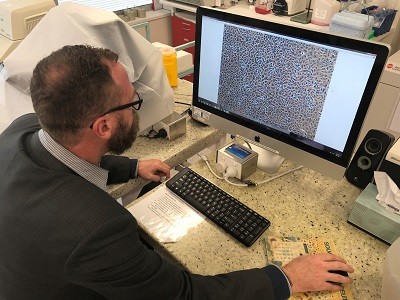New stem cell transplantation method for CF

In Australia, one in every 2500 babies has cystic fibrosis (CF), and one in 25 people carry the defective gene. Even though carriers are not affected by the disorder, they may pass the gene to their children. If both parents are carriers, each of their children has a 1 in 4 chance of being born with the disorder.
Now, the fight against CF has taken a major step forward, with researchers from The University of Adelaide showing that cells causing this genetic disorder could be successfully replaced with healthy ones.
The research published in the journal Stem Cell Research and Therapy applies cell transplantation therapy, normally used in bone marrow transplants to treat immunodeficiency disorders.
Working in mouse airways, the group successfully tested their new transplantation method, using a marker gene in place of the corrective CF gene in initial studies.
“There are 70,000 people worldwide living with CF for which there is currently no cure, and disease in the lungs is the major cause of poor health and a significantly shortened life span,” said Dr Nigel Farrow, a Post-Doctoral Research Fellow from the University of Adelaide’s Robinson Research Institute, who conducted the study alongside Associate Professor David Parsons, head of the research team based in the Women’s and Children’s Hospital.
“Our research which applies stem cell transplantation, involves harvesting adult stem cells from the lungs of CF patients, correcting them with gene therapy and then reintroducing those cells back into the patient,” said Dr Farrow.
“The new transplanted adult stem cells pass on their healthy genes to their ‘daughter cells’ providing a constant means to replenish the airways with healthy cells, and thereby combatting the onset of cystic fibrosis airway disease,” he said.
“The key to these successful transplantations was our innovative method; we first eliminated the existing surface cells, which then created the space required to introduce the new cells,” said Dr Farrow.
CF affects a person’s lungs and digestive system causing a build-up of mucus that seriously impairs their breathing and significantly increases the chances of chest infections. This research demonstrates that, in principle, human airway stem cells can be transplanted into the lining of the lungs.
“If we can perfect this technique, it will accelerate this exciting research which could significantly improve the lives of those living with cystic fibrosis and potentially combat this chronic life-limiting illness,” said Dr Farrow.
Colon cancer DNA in blood can guide chemo decisions
A simple blood test could change how doctors decide which patients with colon cancer need...
Non-invasive blood test helps rule out oesophageal cancer
Designed and developed in Australia, the PromarkerEso test is designed to offer a quick,...
Taste-based flu test enables rapid diagnosis
The diagnostic tool consists of the sensor molecule thymol and a virus-specific sugar building...



